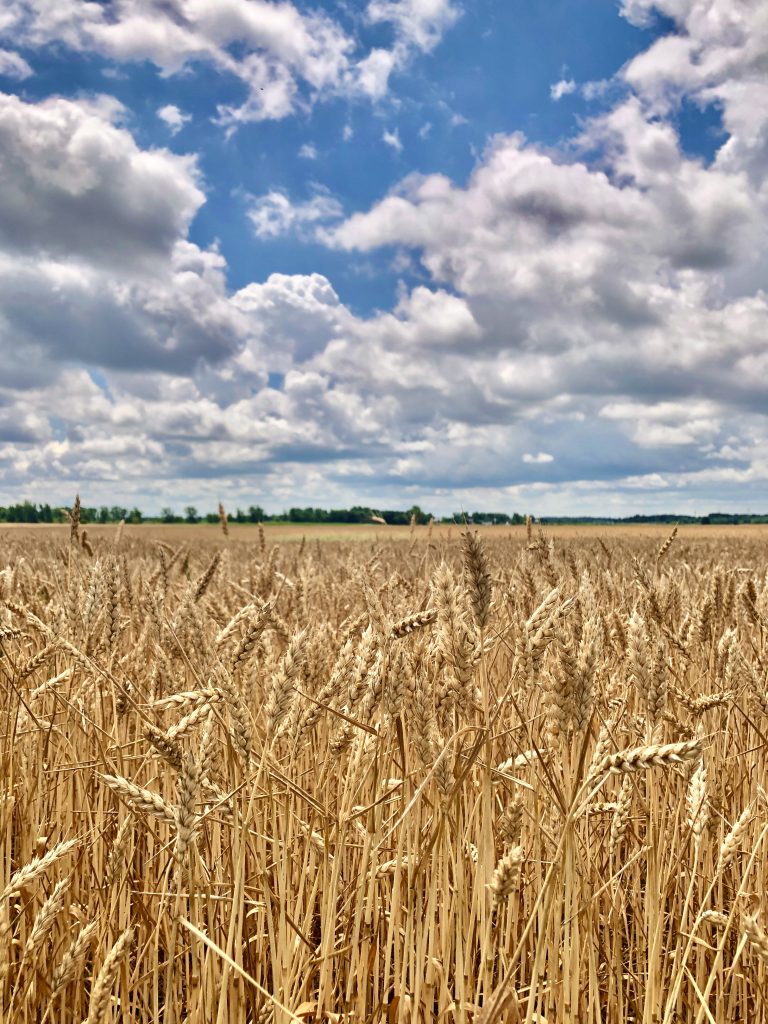
At Zingerman’s, we believe that ideas are like seeds that when heard, given a chance as well as proper care and nourishment, will grow into something great, as in something we dreamed of in a vision. One of those ideas has been our willingness to use local grains or local flours in our baking, in the process supporting our local and regional grain economy, not to mention the flavor boost we would get in our breads and pastries. For the sake of context, let’s rewind back a bit.
A seed is sown
Frank Carollo, the now-retired founding managing partner of the Bakehouse, recalls how they started using locally milled flours not so long after the Bakehouse opened in 1992:
“The Daily Grind was our local organic mill located on Felch Street where the Ann Arbor Distillery is today. They used a hammer mill and we bought whole wheat, whole rye, and cornmeal from them. To my understanding they milled Michigan grains (but I realize now that I probably never quizzed them about that fact). They existed on Felch Street for a few years and then moved their operation to Mason, Michigan. They didn’t deliver- we went to pick it up. I remember driving there myself once and getting 4 pallets that grossly overloaded our truck and the hour drive back was unbelievably frightening as it was almost impossible to keep the truck going in a straight line.”
Besides the scary drive, the metaphorical drive for using local flours in our baking was there from the beginning.
An idea grows into a mission
And it never faded really. 15 years ago or so, Frank test-baked a few loaves of bread using wheat grown by a local farmer thanks to a lead from Michigan State University. We loved the quality of the flour and decided to use it in our Farm bread. According to Frank, the 100 – 200 lbs of flour we bought in the first year barely lasted us a month before we ran out. That experience invigorated Frank’s persistent vision of working with local flours and sparked a long and winding journey of connections with local mills and farmers. Even though such locally grown and milled flours posed challenges – may not be as consistent as commodity flours, can be more expensive, logistically more complicated to get and sometimes more unpredictable due to weather or other local factors, Frank knew the gains would outweigh the negatives: More flavor in our baked goods, stronger relationships with our suppliers and community, more value going back to farmers, and in turn healthier and happier guests enjoying the foods of the Bakehouse. All part of the dream… The stops along this journey have been many:
- Westwind Milling of Swartz Creek, MI (remember Westwind bread?)
- Grand Traverse Culinary Flours of Traverse City, MI (the birth of the True North bread and its special side-kick Chestnut Baguettes, also featuring Michigan chestnut flour!)
- Farmers growing wheat and/or rye for us in Saline, Eaton Rapids, and Sawyer, Michigan as well as in Ohio and Illinois.
Our apologies to those whom we may have inadvertently left out. It’s been a rewarding journey with its ups and downs, where we cheered over new relationships and breads/pastries with heightened flavors, and felt the sadness of losing sometimes a whole year’s worth of crop due to bad weather or storage conditions (in such cases, we were happy to cover an agreed upon cost with the farmers). More recently, we have been closely working with Janie’s Mill of Ashkum, IL and DKB Farms of Columbiaville, MI for local and regional wheat as well as rye.
Stone mills have entered the building
A pivotal point in our journey has also been the introduction of our two beautiful Vermont-made New American Stone Mills into our bakery, starting in 2018. These mills, together with our beloved countertop Mockmill, enabled us to grind the grains we have been getting from the local or regional farms into exceptionally flavorful fresh flours that we keep on injecting into our baked goods. It is thanks to these mills that we have been able to shorten the supply chain needed to have access to fresh local/regional flours. If you are curious, we have listed all the 7 reasons why we love working with freshly milled flours in our bakery.
Frank’s vision, which has been an integral part of the 2023 and 2028 Bakehouse visions, is an ever-evolving reality now, a testament to the power of the visioning practice we believe in and implement at Zingerman’s. The latest additions to this exciting reality are the Kischnick Farm in Frankenmuth and Goetz Farm in Riga, Michigan.
Flourishing partnerships
We have heard of the Kischnicks through our own Ron Maurer, a Partner and Chief Administrative Officer of Zingerman’s Community of Businesses. Chris Kischnick and his family manage about 500 acres of organic farms in the Frankenmuth area, including the 90 acres that they lease from Ron, where his mother still resides. Kischnicks are experienced in organic farming as they are a grower and supplier of the organic beans for Chipotle. Beyond the more commodity crops, they were interested in getting into the niche, small grain market, which would bring them more value for their efforts. We were interested in local grains, and they were interested in growing grains, and to boot, only 1.5 hours from the bakery. It was a great match!
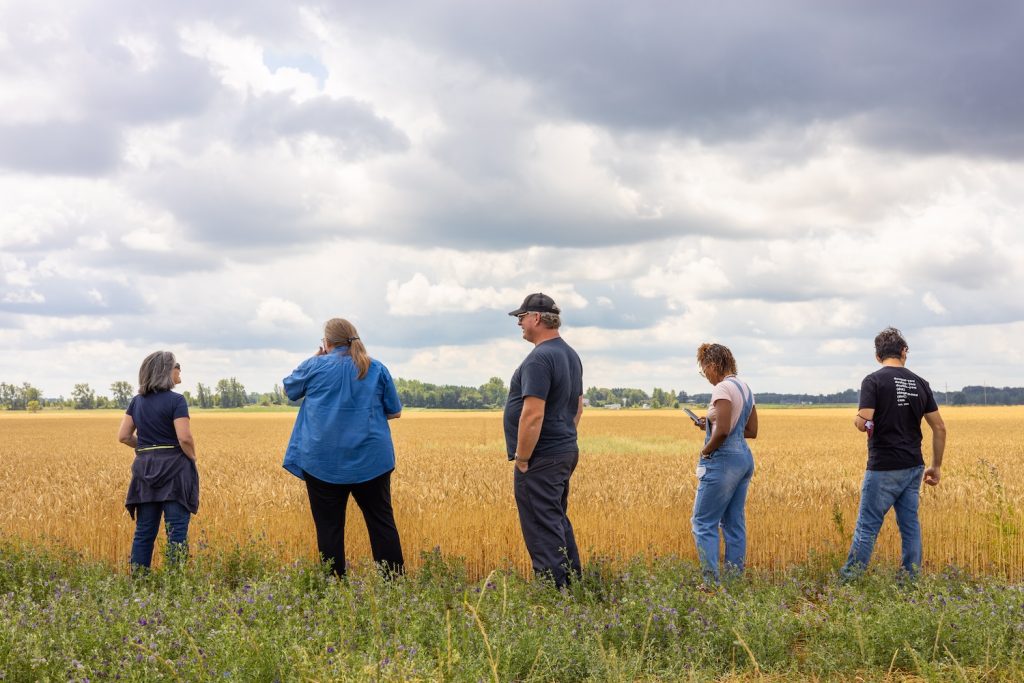
In the fall of 2021, they planted the first crop of soft white winter wheat for us. Our communications kept going, even sometimes receiving emails from Chris Kischnick that he said he’d typed on his tractor during the busy planting days. Farmers are hard-working! As summer of 2022 rolled in and we were anxiously waiting for the arrival of our new local wheat, a few of us from the Bakehouse, including Amy Emberling (our managing partner), Lee Vedder (our historian, pastry baker, retailer and marketer), Corynn Coscia (our marketing manager and photographer), Samantha Etienne (visiting chef) and I, visited the Kischnick centennial farm fields of approaching 125 years with five generations of family history. After a warm welcome at their farm shop in Vassar, MI, only a stones-throw away from Frankenmuth, we followed Chris into the ‘fields of gold’ they had been tending to. The vast expanse of wheat gently swaying in the summer breeze was a sight to take in (and photograph for this blog!).
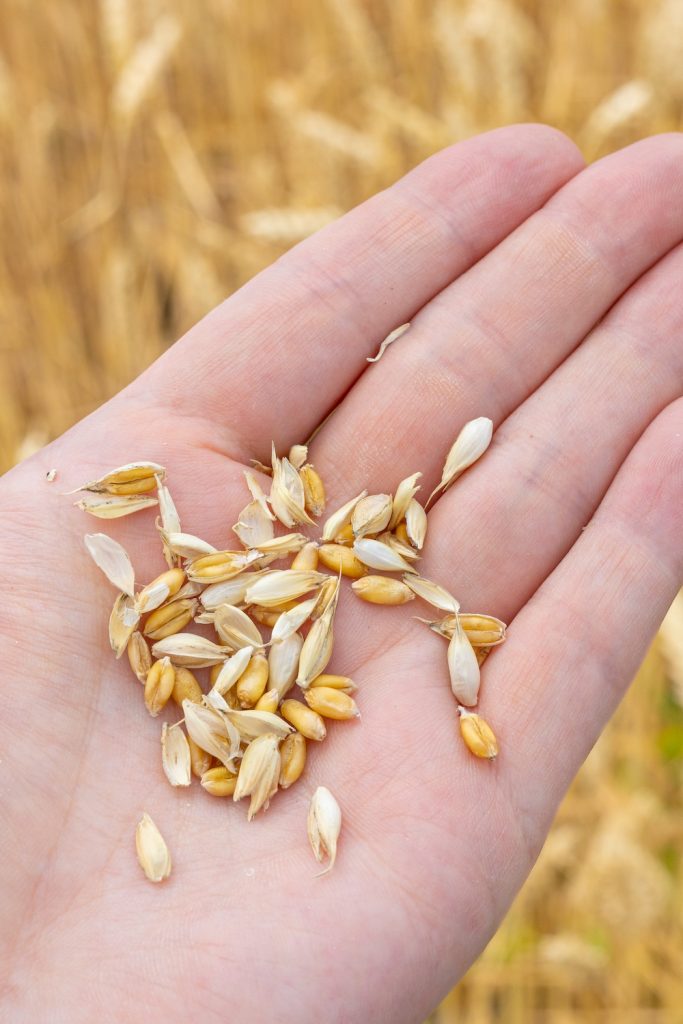
And moreover, it was so humbling to know that the little miraculous seeds decorating the top of the countless golden stems in front of our eyes would eventually become the flavorful and nourishing backbone of so many breads and pastries we make at the Bakehouse for our community! We followed our tour of the fields with a visit to the local bean cleaning and processing plant, the largest of its kind in the US, where Kischnicks had their organic beans processed. Satisfied with more learning for the day (what does it take to clean, sort and package beans at scale!) we finished our day in Frankenmuth with a nice Kischnick – Zingerman’s lunch, where we experienced the warm Midwest hospitality and started daydreaming about a regional mill for Michigan that can provide local delicious flour to many more communities beyond just ours. It’s winter 2023 now, and we are enjoying the 2022 crop of Kischnicks’ soft white wheat, and even had a taste of their first trial of hard red spring wheat with some test sourdough loaves. Moreover, putting another piece of our vision in place in terms of strengthening our local grain economy, Kischnicks are now also selling their organic soft white wheat to the amazing Janie’s Mill in Illinois. Regional collaboration for small grains in action!
Two hours south of Kiscnicks on Highway US-23, only 40 miles from the Bakehouse, is another centennial family farm, the Goetz Greenhouse and Farm. If you enjoy locally grown fruits and vegetables in this part of the state, it’s likely that you have had their delicious produce. The Goetz brothers, Joe and Jacob, who have been working their 300-acre farm with their siblings and parents, visited us at the bakery in the summer of 2023 after they heard about our passion for working with local grains. Similar to the Kischnicks, they want to grow small grains to add further value to their already bountiful operation. And that’s how we connected. Following our meeting, they decided to try their hands at Turkey Red wheat, a heritage winter wheat variety, and a modern hard red spring wheat for us, both of which are suitable for bread baking with good gluten qualities (of course, as much as the growing conditions allow).
Corynn and I visited their farm at the end of September on a cloudy, pleasantly cool Michigan afternoon. We timed our visit such that we could observe the planting of the Turkey Red that Joe planned for the day. In not-so-cold climates like southeast Michigan, winter wheat planted in the fall gets a chance to sprout and essentially look like grass before the winter rolls in. After a long winter nap during which some key biological changes occur (aka “vernalization”), the wheat picks up its growth and shoots skyward with the warmth of the spring to eventually form the wheat head loaded with seeds and then ripen in late July, becoming ready for harvest. Joe welcomed us by their greenhouses where he hopped on his tractor with its grain drill planting equipment in tow and slowly led us to the fields designated for the wheat.
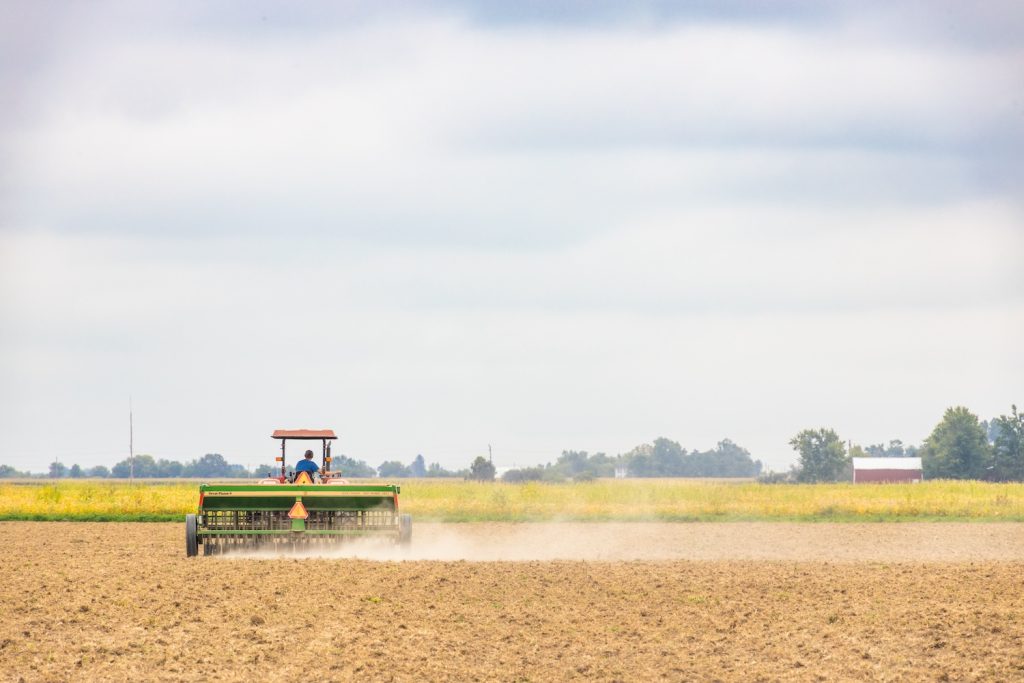
The fields looked unassuming with what looked like small channels in the soil. Joe explained to us that their preparation of the soil included growing alfalfa and hay as cover crops followed by minimal tillage of the soil prior to planting of the wheat. Cover crops help boost soil fertility. Minimal tillage is like flipping of the soil but only a few inches deep, staying more on the surface; this kind of tilling keeps the soil ecology more intact and helps with erosion control besides other benefits.
When I asked him about the tall sunflowers in the fields across the road, he mentioned cover crops, soil fertility and pollinators, the bees. We were getting a feel for the Goetz philosophy- to farm with practices that nourished, that gave back to the soil in order for the soil to keep giving to them in delicious bounty. He explained to us that they wanted to experiment growing the Turkey Red three-ways as an experiment: one with the seeds planted as is without any additions to the soil, one with a biological inoculant that would help boost the nitrogen-fixing bacteria in the soil (Joe likened this to us bakers using a sourdough starter), and one with what he called feather meal added to the field. The latter two are meant to augment nitrogen availability in the soil, which would in turn help with higher nitrogen uptake by the wheat plants, the nitrogen being the main building block for the wheat protein. The hope is for higher protein quantity and quality in the wheat so that it would be more appealing to bakeries, like ours, wanting to use the wheat for bread baking.
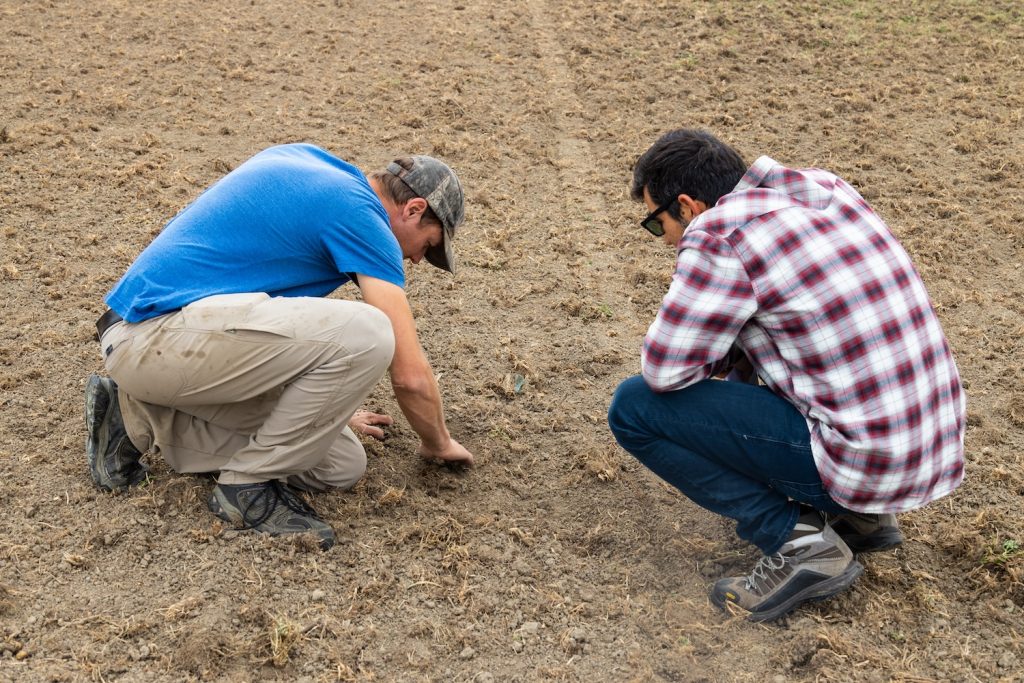
Joe had planted some Turkey Red wheat in the morning, so he wanted to show us the wheat seeds already in the soil. We all kneeled down, gently poking into the soil with our hands. Soon enough, we were able to find a few of the little treasures (in a field of probably a million or more!), nature’s intricately designed procreation capsules, almost perfectly blending into their brownish environment. It was a humbling experience to see the seeds already sown in the ground, waiting for the right conditions to come along and literally sprout to life.
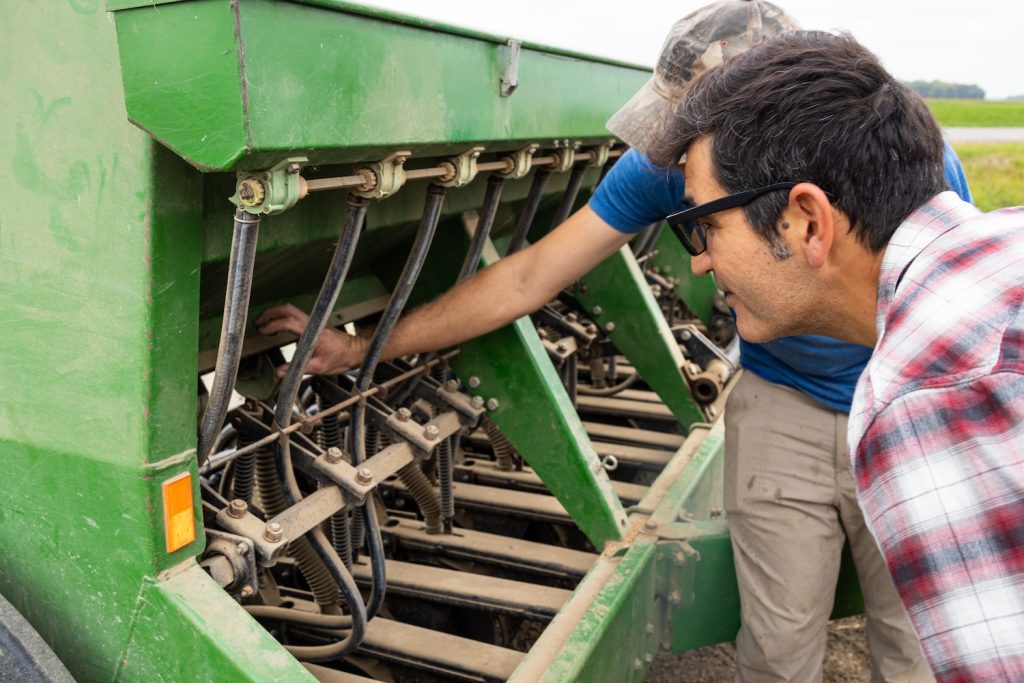
Corynn and I next got a quick education on the workings of the grain drill equipment, how the metal discs open up the soil, the seeds are dropped down through tubes, and the rollers cover up the seeds with soil as the tractor makes its rounds from one end of the field to the other, wrapping around several times.
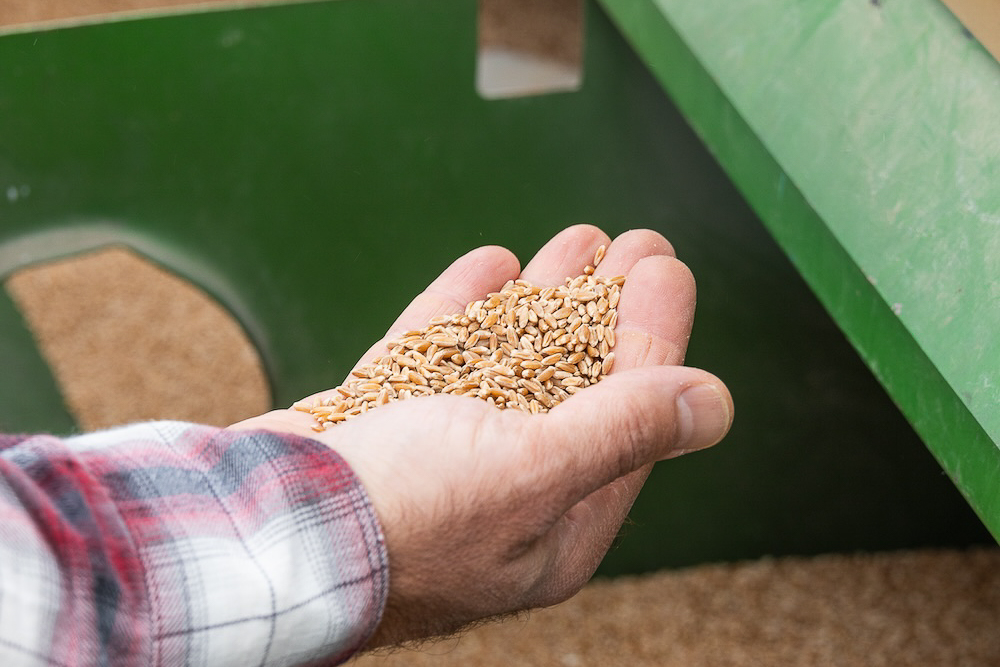
The wheat seeds loaded in the hopper of the grain drill looked perfect too. They were actually Turkey Red wheat berries that they purchased from Janie’s Mill. Isn’t it fascinating that the same wheat one would use for milling into flour could actually grow into future wheat as well? Part of the hope is that if the Turkey Red trials go well, Janie’s Mill will buy some of the Turkey Red from the Goetz Farm. Again, another great example of the kind of collaboration we have been dreaming of for our part of the grain world… As Joe hopped on his tractor, we stepped back and watched him plant another row of the Turkey Red wheat, right next to the field where he will be planting the hard red spring variety next Spring. To be honest, the equipment he was towing looked big, even large scale to my eyes. I knew though that the Goetz Farm was still relatively small compared to its industrial counterparts, and it represents exactly the kind of ‘small’, courageous and forward-thinking farming we need for stronger and more diverse local grain economies, for healthier soils and healthier communities.
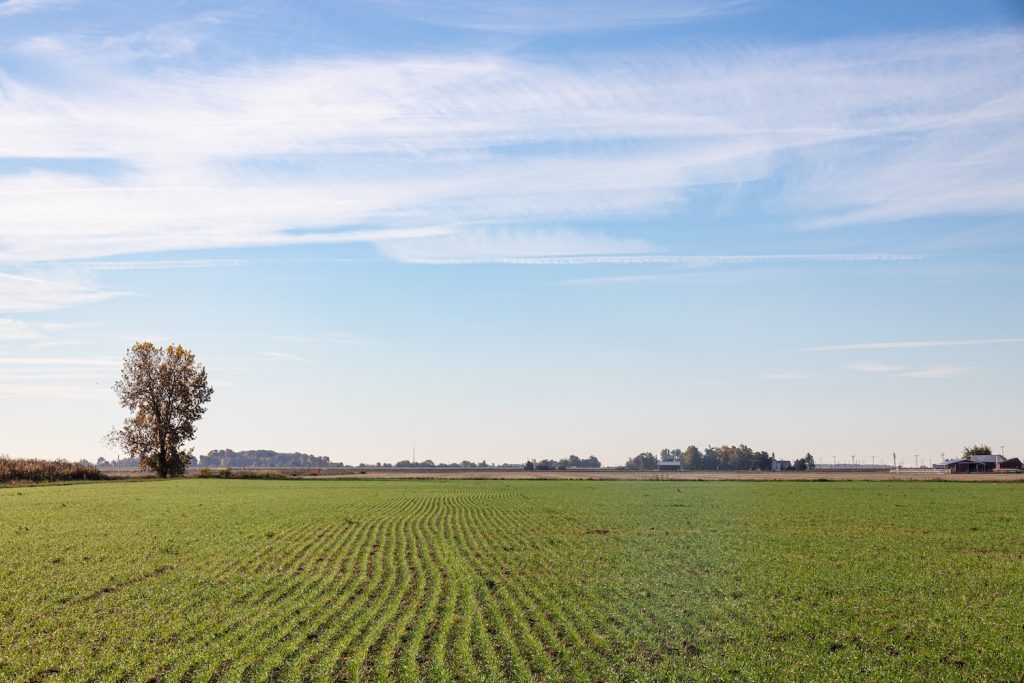
We visited again later in the fall to see the wheat grass beginning to sprout. I am sure that it is as rewarding to our farmers to see the seeds they sow take root and emerge into beautiful, nourishing plants as much as it is for us to see our ideas take hold and come to life. Maybe something to celebrate next time you bite into a slice of Country Miche or Banana Bread… I know I will.
Hungry for more?
- Do a deep dive into our passion for freshly milled whole grains here, here, and here.
- On board with whole grains but not sure how to use them? Check these recipes (for pancakes, rye porridge, and our own Funky Chunky Cookies) to get yourself started.
- Get our new cookbook, Celebrate Every Day, for even more great recipes (from banana bread to carrot cake, just look up “whole-grain flour” in the index!)
Originally from the island of Cyprus, Hazim decided to immerse himself in the world of bread baking and all foods fully flavorful after a career in environmental engineering. He joined the Bakehouse team in 2016 with a focus on bread quality and innovation. You may find him at the bench with his baker friends rolling Farm dough, milling flours on our stone mills, teaching a Naturally Leavened Bread class at BAKE!, tasting breads, loudly (he calls it "passionately") elaborating on the benefits of whole-grain flours or temperature for sourdough baking, or stopping in his tracks to think about the next possible bread or improvement. Science is dear to him, and he loves windsurfing!! He was recently featured on Rise Up! The Baker Podcast with Mark Dyck talking about getting his start in baking, the tension of leaping into a new career, and working on a team where he can be his whole self.
